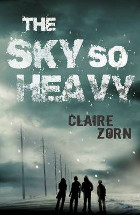The sky so heavy by Claire Zorn

UQP, 2013. ISBN 9780702249761.
(Age: 14+) Highly recommended. Fin is an average teenage boy who
lives with his parents and young brother Max in the Blue Mountains.
He likes Lucy Tenningworth and is just beginning to feel that he may
have a chance with her when he gets a phone call from his mother
telling him to buy all the water and non-perishable goods that he
can and to get home with Max as soon as possible. The next morning
he wakes up to a different world; there is black snow everywhere,
the electricity is out, internet is gone and his mother can't be
reached and his father has gone off with his new wife. Fin and Max
must learn to fend for themselves in this strange new world with its
threat of nuclear war.
This is a very exciting book that clearly shows what it would be
like to live without all the things that we take for granted. As
food supplies begin to dwindle and people get sick, Fin finds that
he has to take on an adult role and care for Max. I really liked the
character of Fin, who tells the story from his point of view. He is
funny and thoughtful, caring and understands his short comings. He
is the one who realises that the black snow is dangerous and won't
let Max touch it. He has to raid the local grocery store for food
and fend off people who want to take the few resources that he has.
Zorn is very clever in the way that she gets her characters to
explore not only what it is like to face a devastated world, but
also the characteristics like resilience and optimism that are
necessary to survive. Other major themes are racism, bullying,
suicide, the existence of God, corruption of power and whether
violence is ever acceptable.
Other characters like Noll and Lucy feel realistic as does the
setting of the small town that is inundated with snow with roads
closed and people isolated. The perils that the little group face on
their road trip to Sydney seeking Fin's mother and safety is vividly
written. The attitude of those who have food and water, and their
closing down the roads into Sydney and refusing to let people
through gives the reader the opportunity to see what it would be
like to be an asylum seeker and be refused refuge.
This is a thrilling read and will appeal to those who enjoyed Tomorrow,
when the war began by John Marsden. It would also make a great
literature circle or class novel as not only does it contain many
themes that could be discussed, it is also well written and
enjoyable. I'm looking forward to the sequel.
Pat Pledger